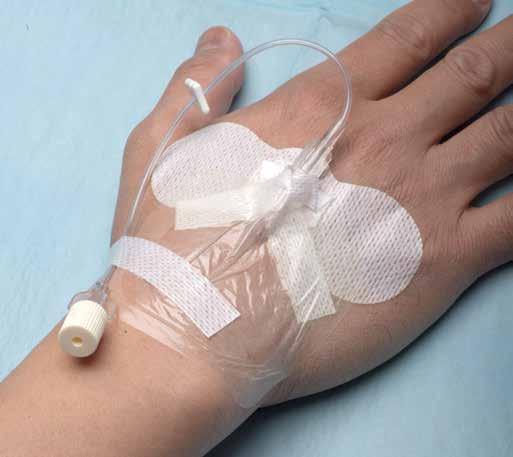
9 minute read
Resourceful and tenacious
from JHC June 2020
Challenges abound, but so do solutions, amid the COVID-19 pandemic
Editor’s note: In the following interview, Ed Hardin, vice president, supply chain, Froedtert Health, provided insights into how his health system has responded to the COVID-19 pandemic.
The Journal of Healthcare Contracting (JHC): Can you discuss your organization’s response to COVID-19?
Ed Hardin: I got involved in the first weeks of my organization’s reaction to COVID-19 in an effort to prepare the organization for increased demands of affected patients. We then moved into an Enterprise Incident Command approach, which directly involves more than 50 and many more indirectly. It’s part of the Hospital Incident Command and a pretty standard and approved way of addressing disasters, and crises. It’s not too unlike what first responders do during natural disasters.
We have a number of different sections within that governance. One of them is called the Logistics Section, and I’m the section chief. Within that, our responsibility is basically providing resources where there is a need. It’s not just supplies; it’s HR related, IT related, and training related. It involves a host of things. My world had been primarily supplies and equipment, but this is far broader. Most hospitals actually, I believe, are functioning this way – the big ones for sure. I’m real proud of our organization for what we’re doing.
JHC: How do you approach this situation compared to the regular supply chain work?
Ed Hardin
Hardin: It’s in large part a different and very intensive type of project management, I was trained in project management in the early 2000s but never had to apply this learning in such a critical way. We’re all learning and kind of drinking from a fire
hose, but it’s a close organization – particularly at the leadership level, we enjoy and respect and one another. So, it's made easier by that but it’s definitely a different dynamic. People’s titles go away. It’s really what you know. So, it’s interesting work.
NOW YOU CAN Gain Efficiency without Compromise
Advanced Catheter Securement that Can Reduce Costs
No hard plastics that can lead to costly pressure injuries
Stays in place up to 7 days, reducing materials costs and nursing time
No additional materials required for application or removal
Helps reduce the risk of complications
Available with PrevahexCHX ™
Antimicrobial Transparent Film Dressing

Always Reach for Something Better Learn more at dalemed.com
JHC: How are you navigating supply disruptions or shortages?
Hardin: As of right now (early April), I feel pretty comfortable where we’re at, but the situation is very fluid. Unlike California and New York, we’ve had time to prepare (in Milwaukee). And so, we’ve become quite the resourceful group. Our regular suppliers are reliable in the sense that we’re getting supplies from them, but we’re all on allocation. We’re not getting what we would want, we’re getting what they can give us. That means that a lot of our purchases in the last three to four weeks have been on allocation.
Dollar wise, probably pretty high, we’re working with suppliers that we normally don’t do business with. In some cases, we’re having to deal directly with the manufacturers in China. So we are covering new ground for our organization. I think we’re doing a pretty decent job, given our experience in this space.
We’ve hit a lot of bumps in the road, but we’ve been resourceful and tenacious. I think those are the two words of the day – resourceful and tenacious. Many of us are working around the clock to see to it that these things happen.
I would tell you that my sense is, because of our academic affiliation, that the community seems to be pretty engaged with us. Milwaukee in general is a very, very generous city. The state is a very generous state, and so that’s demonstrated in the type of gracious support that people are giving our hospital. I hear the same for the other hospitals. Our cup runneth over, so to speak, at Froedtert Health in terms of what the community is doing. Again, we haven’t had a big surge of patients, so it remains to be seen, but I'm feeling pretty comfortable right now.
JHC: What suggestions would you give to other supply chain teams on how to stay sane during a crisis like this?
Hardin: I’ve been pretty healthy, despite my health situation (Hardin was diagnosed with stage four cancer in November 2019), but I was near my wits end until we implemented the Enterprise Incident Command. While the situation can be frustrating because you’re having to learn something new, I think that this actually helps us. My advice is that if your organization has an Incident Command Operation, you as a supply chain leader need to be a part of it. Because if you’re on the outside, you’re probably going to get inundated with requests that aren’t really put into proper context. You’re just simply going to be in reaction mode. But be a part of it, be actively a part of it.
This situation is project management on steroids, right? I think that being resourceful and tenacious involves some level of risk. And I can tell you that your typical suppliers aren’t going to meet your needs, and therefore you’re going to have to be tenacious, resourceful. It’s oftentimes up to the CFO or the CEO, but unless you’re willing to wade into the international supply chain market, I think it’s going to be tough, because the local guys, your regular suppliers, can’t supply. Incidentally, most of the suppliers – and by suppliers in this reference I mean companies that are coming your way and wanting to help you buy masks, and gowns, and other PPE – nearly all of them got into this business two months ago.
Now they’re in it, and some are unsavory. I think that’s part of the risk that you share, but you’re going to have to really sort through it, roll up your sleeves and vet these guys. We have been fortunate that most of the work we’ve done has been with companies that have not been in this business before, but came to us at the recommendation of very respected leaders at our medical school or within our health system. That is the kind of a level of vetting that puts my mind at ease. But yeah, this is about being resourceful, tenacious, and having a willingness to take risks. And I know it makes us feel uncomfortable, but organizations are going to have a difficult time if they’re not willing to do that.
Pulling Together
How Encompass Group stepped up to fill a need during the COVID-19 crisis

As the cases of COVID-19 spiked across the United States, John Wood and the
team at Encompass Group were like a lot of companies – they wanted to help in any way they could. Fortunately, as a leading manufacturer and marketer of textiles, apparel, therapeutic support services, and single-use medical products, they had the ability to do just that.
“A friend at Vizient and I were talking and I told him, ‘It might be a crazy idea, but Encompass has a 510(K), and in the past had been a manufacturer of PPE,” Wood, CEO of Encompass Group, recounted in a recent podcast with John Pritchard, publisher of The Journal of Healthcare Contracting. “We could set that up again domestically or in this hemisphere if the need arose.”
Within three days, Encompass Group began the process to start suppling PPE. “But we did have a few challenges that we needed to face.”
Wood spoke about those challenges, and other ways in which the organization is helping America’s frontline caregivers amid the COVID-19 pandemic, during the podcast.
The PPE process The first step toward producing the PPE supplies involved validating with the FDA that the changes Encompass would make were going to be acceptable. The FDA had set up a portal where people could start applying to manufacture this type of product domestically, “but there was quite a backlog there,” said Wood.
Wood had a conversation with another business partner, Jockey International. Wood told the COO about what Encompass was doing and two days later he had used some of their connections to get in touch with the task force led by Vice President Mike Pence. Just like that, “we were on the phone with the FDA,” Wood said. “We described what we were doing and we were approved within an hour.”
Within four weeks, Encompass went from idea, to procuring the necessary equipment and raw materials, to producing and shipping PPE.
SHARE donation On April 8, as the first of many efforts to respond to the national emergency to combat COVID-19, Encompass Group announced a direct corporate donation through SHARE, a national call-to-action program established by the Society of Nurse Scientists Innovators Entrepreneurs & Leaders (SONSIEL) in partnership with the GLO Good Foundation. The Encompass Group SHARE donation was part of tens of thousands of pieces of protective gear conveyed from private and corporate donors to hospital healthcare staff in over a dozen hard-hit states.
ABC News Nightline featured SHARE program activity with SONSIEL President & Co-Founder Rebecca C. Love and GLO Good Foundation Co-Founder Dr. Jonathan B. Levine. The episode featured footage including jackets being packed and shipped out by Encompass Group.
Encompass Group was also the source of 10,000 scrub units being donated by Jockey International to the healthcare staff at the Jacob K. Javits Convention Center in New York City.
“I think we’ve all seen on the news where healthcare workers were coming home and changing in their garage healthcare workers. Indeed, in healthcare, the line between partners and competitors had become blurry on a normal day. The current crisis has only enhanced collaboration among industry stakeholders. “Everybody’s working together,” said Wood. “It’s been a positive thing to see how everybody’s pulling together to come up with a solution.”
because they don’t want to bring things into their home,” said Wood. “They are having to do laundry every other night so they can keep up with the workload. For them to have at least one more set of scrubs, hopefully that helps a little bit in the things that they’re facing.”
Working together With the challenge before the U.S. healthcare sector, Wood said the team at Encompass Group feels fortunate to be able to continue to work and contribute to meeting the needs of America’s

To listen to the podcast, visit: www.jhconline.com/podcast-encompassgroup-steps-up-to-fill-need-during-covid19-crisis.html.
GROUP ONE ® is code for success


PROFESSIONAL HEALTHCARE APPAREL
PARTNERING WITH ENCOMPASS GROUP BRINGS YOU OUR EXPERTISE AND BELIEF THAT BETTER CARE STARTS WITH SAFETY AND COMFORT.

BRANDING: Create and Maintain Professional Image SECURITY: Easily Identify Your Staff vs. Unwanted Visitors PATIENT EXPERIENCE: Help to Improve HCAHPS Scores EMPLOYEE SATISFACTION: Quality, Style, and Comfort EASE OF ORDERING: Online Solutions
Find out how you can get started with your uniform program today!
Find your Encompass repersentive - Email GroupOne@EncompassGroup.net or visit us online at www.encompassgroup.com










